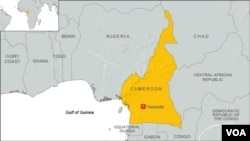Cameroon's government is working to stop the trafficking of young women to the Middle East. The government says hundreds of women and girls have been lured to Kuwait, the United Arab Emirates and other countries in the past five years.
Several students stand at the entrance to the University of Yaounde. They read posters advertising jobs in Kuwait, Qatar, Lebanon and the United Arab Emirates. The ads promise monthly salaries of up to $700.
"If I work for a year, I will be able to save 3.6 million francs so I am ready to sacrifice five years before I return to create a business back here," said Carole Yemngang, a 19-year-old student. "Why should I continue with my studies when thousands of others graduate and are never recruited?"
VOA called the number listed on a poster offering jobs of sales agents, nurses and teachers.
"Everybody who comes will never regret because the opportunities are good…”
The man declined to give his name. VOA went to the address he indicated but was told the company had moved.
Police said the phone number belongs to a Cameroonian under investigation as a middle man for traffickers.
Many of the women go to Kuwait, like 30-year-old Pauline Manyi.
She says her father had died and she was looking for a better life, an adventure. She says she was told Arabs needed translators from the English to the French and vice versa.
Instead she says her passport was taken and she was sold to a family where she was raped and forced to do housework.
Another woman, 24-year-old Kebam Eucharia, just returned to Cameroon in April.
She says her family had borrowed money to send her to Kuwait to work but she was sold to a man at the airport when she arrived.
“I had no rest, working round the clock," ssaid Eucharia. "I will finish work around 3 o'clock in the night. There is no food. Then the next morning, they come and wake me up at six o'clock. They say yela, get up. Start your work. The only thing they give you as food is one of their bread and a small cup of tea. That is it for the whole day.”
Both women escaped and made it to the embassy of the Central African Republic in Kuwait City to phone their families.
In April, Cameroon appointed its first ever ambassador to Kuwait and Qatar and announced that it will soon open its own embassy in Kuwait City. Families of trafficked women told VOA they hope the diplomatic presence will make it easier to intervene.
Lawmakers and journalists brought the matter up with a Kuwaiti parliamentary delegation that visited Yaounde in March. The delegation said they would investigate but that it was not the purpose of their visit.
Cameroonian airport authorities now screen women and girls heading to the Middle East.
Francisca Awah is president of the Association Against Human Trafficking.
"Since they have blocked the girls from going to Kuwait from all international airports in Cameroon, they pass through Nigeria to go to Kuwait. So that is the new means. They are still going and most of them go there to be prostitutes," Awah said.
Awah and other survivors give talks at schools and universities warning of the dangers of trafficking. They told their stories on state radio and television April 21st.
The next day, VOA returned to the university to find that the posters advertising jobs in the Middle East had been pulled down.




